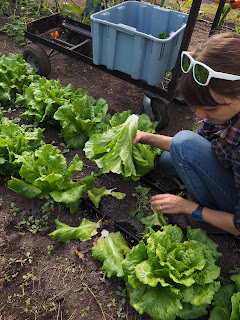Annalisa Hultberg, Extension Educator, food safety
Attend a GAPs training this winter to update your farm's food safety plan, learn about current food safety recommendations and best practices, research and regulation. If you do need a GAP audit for your farm, a food safety training is the first step in preparing. Here are options for winter food safety training from UMN Extension. All trainings are led by UMN staff and trained experienced farmers.
GAPs Half-Day Training Course
This 3.5-hour online course offers an in-depth look at GAPs on the farm and is a "one stop shop" to learn about food safety best practices in the production, washing, packing, storage and transport of fresh produce. These sessions are strongly encouraged for all fresh produce farms regardless of size, including those selling to farmers' markets, CSAs, farm to school and wholesale or operating donation gardens. Trainers include experienced farmers and Extension staff. Classes will close at capacity - register early. Registration closes 2 days before training.
Dec 2: 9:00am - 12:30pm (farmer trainer Joan Olson, Prairie Drifter Farm)Jan 26: 1:00pm - 4:30pm (farmer trainer Jane Jewett, WillowSedge Farm)
Feb 17: 9:00am - 12:30pm (for Extension Master Gardener Volunteers)
Mar 11: 9:00am - 12:30pm (farmer trainer Laura Frerichs, Loon Organics Farm)
Register here for any of these trainings: https://z.umn.edu/GAPsTraining
Course is $15 per farm/organization and includes a certificate of attendance for all participants (scholarships available, email <wins0115@umn.edu>).
Harvesting best practices are some of the recommendations covered in GAPs training
One Hour GAPs Deep-Dive Webinars
These one-hour interactive webinars will cover specific topic areas related to food safety on the farm. You will have the opportunity to learn from experienced farmers and Extension staff in each session. Bring your questions! Sessions recorded but you must register to receive recording. All Deep Dive sessions are 9:00am – 10:00am CST.
The one hour deep dive sessions are free to attend but you must register in advance at https://z.umn.edu/GAPsDeepDive.
Feb 9: Lean & Clean: Applying Food Safety and Lean Farming Concepts to Fruit and Vegetable Farming. Learn about Lean Farming principles as they relate to operating a small produce farm. Guest speaker Ellen Polishuk, a 35-year farming veteran and co-owner of Potomac Vegetable Farms in Northern Virginia has integrated Lean Farming techniques and improved her farm, employee morale and the safety of the produce.
Feb 16: Packshed design for improved product postharvest quality and safety. Packshed layout, equipment selection and postharvest handling are important for product quality and food safety. Guest speaker Katie Bishop, co-owner of PrairiErth Farm in central Illinois will share about how she has designed an efficient and safe packshed for their large vegetable operation.
Feb 23: Recordkeeping on farm for food safety and profitability. Hear about new recordkeeping apps, tools and tricks to take the stress out of records on your farm. Guest speaker Jack Pahl of Pahl’s Market, Apple Valley, Minnesota will talk about records on their large produce and greenhouse operation for passing a GAP audit, profit tracking and more.
March 2: Managing Produce Safety Risks of Rotating Livestock through Produce Fields/Orchards. If you apply manure to your fresh fruit & vegetable fields or rotate livestock in the fields or orchards, it is important to take steps to reduce risk, so the manure doesn't become a source of contamination of your fresh produce. Guest speaker Jeff Bender DVM, will discuss current research and best practices to both build soil health and fertility through livestock while protecting public health.
For questions about this educational series please reach out to Annalisa Hultberg; UMN Extension Educator, Food Safety at hultb006@umn.edu. If you have questions or need assistance with registration, please contact Katie Drewitz at wins0115@umn.edu or call 320-255-6169 ext. 1.


Comments
Post a Comment